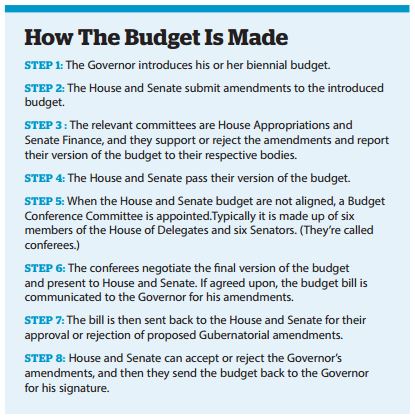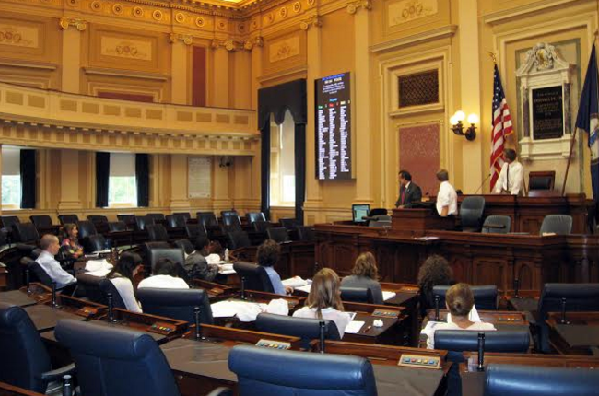Each winter, one hundred state delegates and forty state senators convene for the Virginia General Assembly, in either a 45-day “short session” or a 60-day “long session.” This year—it was a long session.
As I’m writing this article, the General Assembly is in its closing days. And while not everything is final, I can provide a fairly good rundown of what occurred this session from PEC’s perspective.
On the subject of land conservation funding, it’s looking more and more like a win. Not one of monumental scale—and not the amount many had hoped—but still a substantial increase in funding for conservation programs for 2016 and 2017. On bills related to land use and transportation, there was evidence, yet again, of the influence of money on policy.
The Good
Conservation Grant Funding
Thanks to a multi-year bipartisan effort, the Governor’s budget, put forward in December, contained $40 million for grant programs for land conservation ($20 million each year for two years).
This funding fulfills a bi-partisan commitment made by the General Assembly in 2013, when it passed House Bill 1398. The legislation, introduced by Del. Lee Ware of Powhatan County, promised additional funding for open spaces, farms and forests, and the protection of historic resources through three grant programs: Virginia Land Conservation Foundation, Virginia Battlefield Preservation Fund and the Office of Farmland Preservation. Unfortunately, the promised funding has never been included in a budget—until this year.

But here’s where it gets a little messy: The budget that passed the House trimmed it down to $39 million ($19.5 million per year for FY 2017 and 2018), and worse, the budget that passed the Senate cut it in half to $20 million ($10 million per year for FY 2017 and 2018). The conference committee opted to go with the smaller number passed by the Senate. Now, the budget goes back to the Governor for his signature with this reduced level of funding.
While $20 million is a significant increase, it’s half of what was promised, and half of the amount both the Governor and the House supported. We are requesting the Governor send back an amendment bringing the level of funding back up to $40 million, or as close to that as possible.
Agricultural Best Management Practices
We consider items such as stream buffers and alternative water sources for livestock as one of the most important measures the Commonwealth can take toward improving local water quality and meeting its obligations for the Chesapeake Bay. As well, these measures stimulate the rural agricultural economy with the investment in our farms and provide employment in rural areas. The Governor provided $61.7 million for Agricultural Best Management Practices, and this amount was preserved in both the House and Senate version, signalling strong support for the program moving forward.
The Bad
State Parks Bond
The Governor put forward a bond proposal that included $140 million for new acquisitions and state parks, including money to open land-banked parks (lands owned by the state but not open to the public). The House removed all funding, and the Senate provided only $45 million, allowing no room for opening up parks or for additional acquisitions.
Virginia Outdoors Foundation Funding
Senator Vogel introduced a budget amendment for the Virginia Outdoors Foundation that was rejected by the Senate. The agency is facing financial challenges as demands on their staff grow, both for new easement acquisitions and for the stewardship of the 750,000+ acres they already protect. Unfortunately, those issues were not recognized, leaving VOF severely understaffed and using outdated technology.
And The Color of Money

Unfortunately, you can count on land use bills to bring out evidence of the corrupting influence of money in politics and on policy. Some years it’s Dominion Power or the Home Builders Association of Virginia. This year, it was both.
Gutting Proffers
Developers, primarily those associated with the Home Builders Association of Virginia, have successfully convinced the legislature to make sweeping changes to the proffer system. In Virginia, when a developer is seeking approval for a rezoning, they typically offer to help pay for specific costs generated by the rezoning. These voluntary contributions, known as proffers, help ensure that existing residents aren’t paying for the impacts caused by new residential development.
Proponents stated that proffer reform was necessitated by county abuse of the system. But, more likely, it is the influence of campaign contributions from the Home Builders Association of VA (HBAV) and individual developers that won the day—contributions from HBAV alone to political campaigns from 2006-2015 were over *$1,584,000.
The bill, which passed the Senate (33-Y, 5-N, 2-A) and the House (72-Y, 26-N, 2-A), relies on ambiguous language and legal uncertainty that will likely cause most localities to avoid any significant discussion or consideration of proffers. Senate Bill 549 (Saslaw and Obenshain) has already been signed into law, without amendment, by the Governor—despite the objections of multiple jurisdictions (including Loudoun, Fauquier and Albemarle), the Virginia Association of Counties, the Virginia Municipal League, and the conservation community.
Transmission Lines and Historic Resources
House Bill 908 (Minchew) sought to address deficiencies in the process for permitting transmission lines by adding language to the code on avoidance and minimization of impacts. After the Subcommittee hearing, the bill passed with a 10-2 vote. The full House Commerce and Labor Committee took up the bill and voted to refer it to a commission that meets over the summer to study renewable energy issues. We had high hopes when the Subcommittee got behind the bill, but, with 48-hours between that vote and the full committee meeting, Dominion decided it was time to kill the bill.
Dominion used a full court press strategy and scare tactics to imply that they would have to build their transmission lines in residential neighborhoods, if they avoided historic resources. The good news is this conversation will now continue and will take place in a public forum with agencies and organizations weighing in. The bad news is, as one of the leading contributors to political campaigns (with over *$10,541,000 contributed from 2006-2015), the big utility’s influence on the legislature leaves many of us asking, “Whose ‘Dominion’ is it?”
To stay up to date on news, local issues and events, sign up for our email alerts at pecva.org/signup.
This letter was featured in our Spring 2016 Member Newsletter, The Piedmont View.
